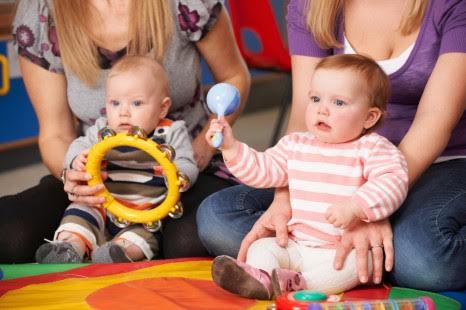Blog
-

How Music Rocks a Baby’s Responses to Speech
 2 May , 2016
2 May , 2016
A new study from the Institute for Learning & Brain Sciences (I-LABS) at the University of Washington (UW)has shown that a series of play sessions with music improved 9-month-old babies’ brain processing of both music and new speech sounds, which adds credence to previous recommendations from baby experts to expose babies to music as early as possible to boost their developing brains. The new findings take those recommendations a step further by highlighting the importance of rocking babies in sync with music to boost their brain function in relation to music and speech.
“Our study is the first in young babies to suggest that experiencing a rhythmic pattern in music can also improve the ability to detect and make predictions about rhythmic patterns in speech,” said lead author Christina Zhao, PhD, a postdoctoral researcher at I-LABS. “This means that early, engaging musical experiences can have a more global effect on cognitive skills.”
In an article published this week in The Proceedings of the National Academy of Sciences, Zhao and co-author Patricia Kuhl, PhD, explained that infants experience a complex world in which sounds, lights, and sensations vary constantly, and a baby’s job is to recognize the patterns of activity and predict what’s going to happen next.
“Pattern perception is an important cognitive skill, and improving that ability early may have long-lasting effects on learning,” said Kuhl, who is also co-director of I-LABS.
Language is like music in that it has strong rhythmic patterns, say the study authors, and the timing of syllables helps listeners define one speech sound from another and understand what someone is saying. Babies learn to speak through their ability to identify differences in speech sounds.
For their study, the I-LABS researchers designed a randomized-controlled experiment to see if teaching babies a musical rhythm would help the babies with speech rhythms. Over the course of a month, 39 babies involved in the study attended 12 15-minute play sessions in the lab with their parents. The babies sat in small groups with their parents, who guided them through the activities.
According to an article about the study from UW writerMolly McElroy, in the 20 babies assigned to the music group, recordings of children’s music played while a researcher led the babies and their parents through tapping out the beats in time with the music. All the songs were in triple meter — like a waltz — which the researchers chose for being relatively difficult for babies to learn. The 19 babies in the control group attended play sessions that did not involve music, where they played with toys, blocks, and other objects that required coordinated movements without music.
“In both the music and control groups, we gave babies experiences that were social, required their active involvement and included body movements — these are all characteristics that we know help people learn,” Zhao said. “The key difference between the play groups was whether the babies were moving to learn a musical rhythm.”
The researchers report that within a week after the play sessions ended, the families returned to the lab to measure the babies’ brain responses via magnetoencephalography (MEG) wherein the precise location and timing of brain activity was identified. The researchers focused their analyses on the auditory cortex and the prefrontal cortex, which is important for cognitive skills such as controlling attention and detecting patterns, and found that babies in the music group had stronger brain responses to the disruption in both music and speech rhythm in both the auditory and prefrontal cortex, compared with babies in the control group. This suggests that participation in the play sessions with music and rhythm improved the infants’ ability to detect patterns in sounds.
“Schools across our nation are decreasing music experiences for our children, saying they are too expensive,” Kuhl said. “This research reminds us that the effects of engaging in music go beyond music itself. She added that early experiences with music have the potential to boost broader cognitive skills that enhance children’s abilities to detect, anticipate and react quickly to patterns in the world.
Source: I-LABS, University of Washington
Image credits: University of Washington; © Ian Allenden





























































































































































































































































































































































































































































































































































































